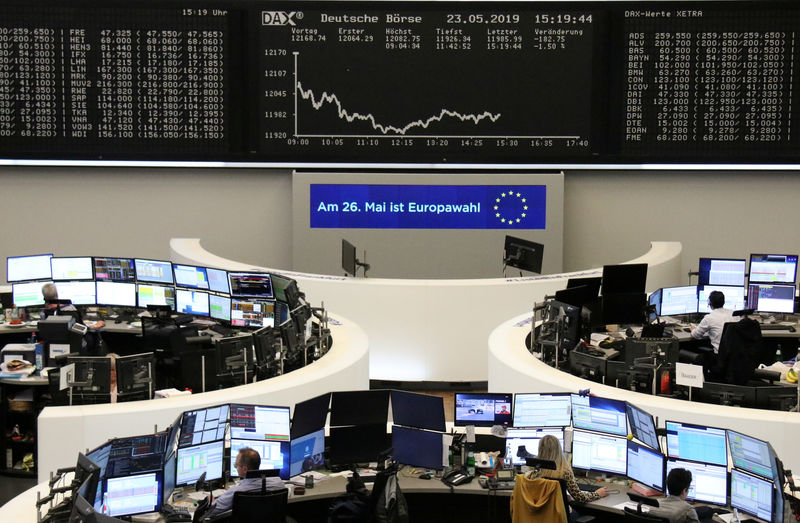By Tommy Wilkes
LONDON (Reuters) - European shares rose on Monday as investors snapped up automaker stocks following confirmation of merger talks between Fiat Chrysler and Renault (PA:RENA), and after European parliamentary elections saw pro-Europe parties cling to a majority.
The gains followed a stronger showing in Asian markets, where shares rose but remained near 4-month lows. The MSCI world equity index, which tracks shares in 47 countries, was ahead by 0.1%.
The pan-European STOXX 600 added 0.4% with all major European indices in the black, although trading volumes were thin with markets in the United States and United Kingdom closed for market holidays.
Auto stocks climbed 1.8% as Italian-American carmaker Fiat Chrysler confirmed it had made a "transformative merger" proposal to French peer Renault in a deal which would create the world's third-biggest carmaker. Shares of both companies rallied.
Markets were also buoyed as pro-European parties retained a firm grip on the EU parliament, provisional results from the bloc's elections showed, though eurosceptic opponents saw strong gains.
Investors had been worried about eurosceptic parties gaining a 30% vote share - the level at which they could seriously disrupt European governance and the region's ability to show unity in addressing key concerns like a global trade war.
But while far-right, nationalist or anti-EU groups came out on top in Italy, Britain, France and Poland, they failed to alter dramatically the balance of pro-European power in the EU assembly.
"The impression of a fragmented political system remains, but perhaps when all is said and done, the message will be that Brexit has reduced appetite to leave the EU," said Kit Juckes, FX strategist at Societe Generale (PA:SOGN).
The euro initially rallied above $1.12 but by 0920 GMT the single currency was struggling, down 0.1% at $1.1195.
The dollar index gained 0.1% in quiet trading.
"In the simple world of FX a possible crisis is averted, leaving us with familiar issues. Europe needs more growth and while EU leaders argue over who gets which top jobs, it needs easier fiscal policy perhaps most of all," Juckes said.
European government bond markets were little moved with the spread between the German 10-year bond yield, considered one of the world's safest assets, and the Italian 10-year government bond yield little moved after initially narrowing.
Spanish and Portuguese bond yields hit record lows - a sign of investor confidence after the election results.
Elsewhere, U.S. President Donald Trump's visit to Japan was overshadowed by trade tensions. Trump pressed Japanese Prime Minister Shinzo Abe to even out a trade imbalance with the United States.
Escalating trade tensions between the United States and China have rattled investors in recent weeks, pressuring stocks lower just as concerns build about weakening momentum in the world's largest economies.
The yen, often the currency of choice for nervous investors, fell 0.2% against the dollar to 109.495 but remained close to four-month highs hit earlier in May as traders looked for safety in the face of mounting trade-related woes.
China's yuan rose to a 1-1/2 week high against the U.S. dollar on Monday, buoyed by a senior official's warning not to bet against the Chinese currency.
The pound held around $1.2703. Sterling had bounced back from a near five-month trough of $1.2605 after British Prime Minister Theresa May last week named a date for her to step down - triggering a leadership contest during which investors fear the risk of a no-deal Brexit will rise.
Oil prices mostly fell, extending losses from last week when crude dropped the most this year. Concerns the Sino-U.S. trade war could trigger a broad economic slowdown have sent this year's oil rally into reverse, although OPEC's supply cuts provided some support.

Front-month Brent crude futures, the international benchmark for oil prices, rose 0.1% to $68.80 per barrel while U.S. West Texas Intermediate (WTI) crude futures shed 0.5% to $58.33 per barrel.